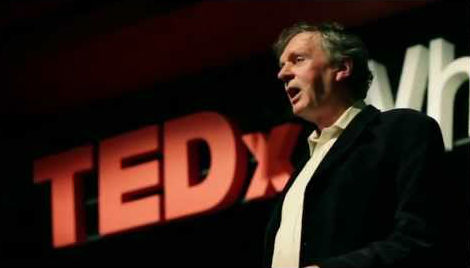 Scientist Rupert Sheldrake’s recent work lays bare many of the unexamined assumptions common in mainstream science. I was very pleased to find that the first online comment on “A Question of Faith,” my interview with Sheldrake in the new issue, brought up the ban on his TED talk, and was from a scientist, at that. The commenter—a physician—explained how the ban caused him to rethink the effect of scientific dogma in his own practice. This convinced me that the ban itself is quite revealing. Proponents of the ban may have celebrated their early success, but the result has been more complex in that it has provided fodder for Sheldrake’s arguments.
Scientist Rupert Sheldrake’s recent work lays bare many of the unexamined assumptions common in mainstream science. I was very pleased to find that the first online comment on “A Question of Faith,” my interview with Sheldrake in the new issue, brought up the ban on his TED talk, and was from a scientist, at that. The commenter—a physician—explained how the ban caused him to rethink the effect of scientific dogma in his own practice. This convinced me that the ban itself is quite revealing. Proponents of the ban may have celebrated their early success, but the result has been more complex in that it has provided fodder for Sheldrake’s arguments.
Talks from Rupert Sheldrake and Graham Hancock given at the TEDx Whitechapel event titled “Visions for Transition: Challenging Existing Paradigms and Redefining Values” were both banned following recommendations from a faceless “Science Board,” which turned out to be heavily influenced by the most unsavory of militant atheists. The most active in the controversy appears to be PZ Myers, who is accustomed to being publicly denounced by even atheist organizations and figures for inflammatory writings and such tone-deaf stunts as ripping out pages of the Qur’an, piercing them with a nail, throwing them in the trash with coffee grounds and a banana peel, and proceeding to photograph the scene for his blog. (Not all New Atheists share such a view. Daniel Dennett, perhaps the most popular figure in the most recent atheist movement, is said to have commented to Sheldrake that he thought TED had made a mistake with this whole controversy.)
Sheldrake’s talk was removed from TEDx’s YouTube channel and relegated to the TED blog, where it remains hidden from most of the TED community. The TEDx organizers responded by publicly condemning the way in which the talk was treated on the TED blog where it was moved, in addition to the general lack of integrity with which the talks were treated by TED management.
Over at the TED Blog Sheldrake responded to each criticism leveled by TED’s science board. And TED moderators opened up the blog to community discussion, with mixed results. TED’s curator, Chris Anderson, even voiced his disappointment with criticisms against Sheldrake’s talk: “Maybe I’m expecting too much for this forum, but I was hoping scientists who don’t buy his ideas could indicate WHY they find them so implausible.”
Blogger Sebastian Penraeth (see his excellent blog post on the subject here) brought to our attention a comment by Conor O’Higgins that sums up many of the arguments for banning the talk:
– Sheldrake claims that there is dogma that [X]
– But I found this statement by scientist [Y] questioning [X]
– Therefore Sheldrake is wrong about there being a dogma.
This kind of criticism is misguided as Sheldrake goes to great lengths not only to assert the prevalence of views that contradict the predominant scientific worldview among scientists (51% of scientists even believe in God or a “spiritual force,” whatever that means), but also to advocate the need for greater tolerance for plurality in science, which he describes as pluralistic to begin with. What Sheldrake critiques is the culture of science and the academic world, “generally speaking.” Those who dismiss such generalization must also deny the existence of scientific paradigms, ultimately precluding the possibility of any such critique. No reasonable scientist or atheist holds all these views wholeheartedly, and that’s pretty much the point. The current scientific paradigm, with its allegiance to late 19th-century material philosophy, has reached its internal limits.
The ban demonstrates that there is a need for such critique, and that the existence of scientific fundamentalism isn’t imagined. The TEDx even was titled “Challenging Existing Paradigms,” for Buddha’s sake. The irony here is that the name-calling criticisms of Sheldrake’s talk and the subsequent ban are completely in line with Sheldrake’s view that, aside from the creativity of its methodology, science is often practiced hand in hand with deeply held and unexamined assumptions that are no more provable, and no less ideological, than other total systems.
Read Tricycle’s interview with Rupert Sheldrake from the new issue here.